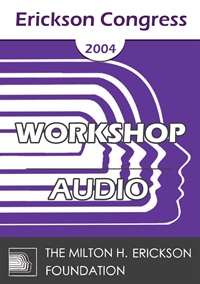
- Average Rating:
- Not yet rated
- Topic Areas:
- Workshops | Anxiety | Depression | Hypnotherapy | Panic
- Categories:
- Erickson Congress | Erickson Congress 2004
- Faculty:
- Sofia Bauer
- Duration:
- 1:48:36
- Format:
- Audio Only
- Original Program Date:
- Dec 05, 2004
- Short Description:
- In working with the problems of panic disorder, phobias and depression, this workshop will show how new hypnotic techniques using paradoxical behavior can effect solutions.
- Price:
- $15.00 - Base Price
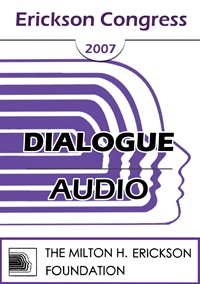
- Average Rating:
- Not yet rated
- Topic Areas:
- Dialogues | Anxiety
- Categories:
- Erickson Congress | Erickson Congress 2007
- Faculty:
- Carol Kershaw, EdD | Reid Wilson, PhD
- Duration:
- 59:43
- Format:
- Audio Only
- Original Program Date:
- Dec 08, 2007
- Short Description:
- IC07 Dialogue 08 - Changing Anxious States - Carol Kershaw, Ed.D., R. Reid Wilson, Ph.D.
- Price:
- $15.00 - Base Price

- Average Rating:
- Not yet rated
- Topic Areas:
- Workshops | Anxiety | Depression | Hypnosis | Phobia
- Categories:
- Erickson Congress | Erickson Congress 2007
- Faculty:
- Sofia Bauer
- Duration:
- 1:53:17
- Format:
- Audio Only
- Original Program Date:
- Dec 06, 2007
- Short Description:
- This workshop will demonstrate how we can start with the symptom and discover new ways to use hypnosis for diseases like phobias, panic disorders and depression. Dr. Bauer will describe interpersonal techniques to help these patients.
- Price:
- $15.00 - Base Price

- Average Rating:
- Not yet rated
- Topic Areas:
- Short Courses | Anxiety | Children and Adolescent Therapy | Ericksonian Hypnosis and Therapy Techniques
- Categories:
- Erickson Congress | Erickson Congress 2007
- Faculty:
- Lynn Lyons, LICSW
- Duration:
- 1:19:39
- Format:
- Audio Only
- Original Program Date:
- Dec 07, 2007
- Short Description:
- Excessive anxiety in childhood is a significant predictor of eventual comorbid depression and other conditions. This presentation will identify the cognitive processes and coping strategies that help create a cycle of anxiety, psychological isolation and depression in anxious children and families. Attention will be given to the development of specific, empirically supported Ericksonian strategies which can help shift the anxious individual and family toward malleability, creativity and adaptability.
- Price:
- $15.00 - Base Price

- Average Rating:
- Not yet rated
- Topic Areas:
- Short Courses | Phobia | Anxiety | Brief Therapy
- Categories:
- Erickson Congress | Erickson Congress 2007
- Faculty:
- Kevin Humphrey, MA | Allan Sargent | Marilyn Sargent
- Duration:
- 1:12:25
- Format:
- Audio Only
- Original Program Date:
- Dec 07, 2007
- Short Description:
- Sargent's "Phobia Release Process; Heal the Essence of Self;" What if you could neutralize a phobic response in about 20 minutes, giving your clients a choice of how they respond in the face of that old stimulus? The Sargent Phobia Release Process stops knee-jerk, out-of-control panic reactions, and more importantly, gives the clinician the tools to then discover the underlying perceived threat to safety. Update the brain's database by reprogramming the amygdale in each hemisphere.
- Price:
- $15.00 - Base Price
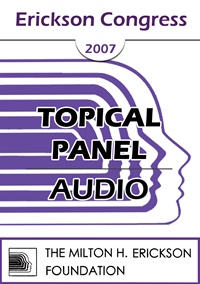
- Average Rating:
- Not yet rated
- Topic Areas:
- Topical Panels | Anxiety | Phobia
- Categories:
- Erickson Congress | Erickson Congress 2007
- Faculty:
- Sonja Benson, PhD | Teresa Garcia-Sanchez, MA | Sidney Rosen, MD | Reid Wilson, PhD
- Duration:
- 57:43
- Format:
- Audio Only
- Original Program Date:
- Dec 08, 2007
- Short Description:
- IC07 Topical Panel 04 - Anxiety & Phobias - Sonja Benson, PhD, Teresa Garcia-Sanchez MA, ECP, Sidney Rosen, MD, R. Reid Wilson, PhD
- Price:
- $15.00 - Base Price
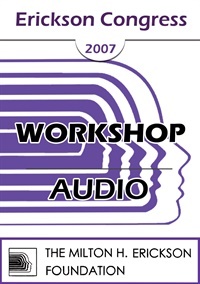
- Average Rating:
- Not yet rated
- Topic Areas:
- Workshops | Anxiety | Depression | Ericksonian Hypnosis and Therapy Techniques | Self-Relations | Utilization
- Categories:
- Erickson Congress | Erickson Congress 2007
- Faculty:
- Stephen Gilligan, PhD
- Duration:
- 1:50:36
- Format:
- Audio Only
- Original Program Date:
- Dec 07, 2007
- Short Description:
- A key idea in Milton Erickson's work was that a person's problematic experiences and behaviors can be skillfully accepted and utilized as the basis for therapeutic change. Self-Relations psychotherapy develops this idea further, emphasizing symptoms as indicating the death of an old identity and the impending birth of a new identity. Thus, we don't try to "get rid of" depression, anxiety, or other "acting out/acting in" expressions, but instead invite them into a human relationship of "sponsorship", where their healing and helpful nature may be realized. We will see how a therapist can generate a ritual space where symptoms and other disturbing experiences can be "midwifed" into new identities.
- Price:
- $15.00 - Base Price
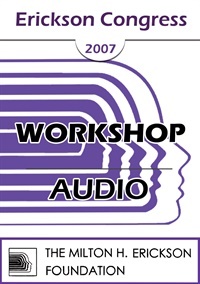
- Average Rating:
- Not yet rated
- Topic Areas:
- Workshops | Self-Hypnosis | Phobia | Anxiety | Hypnosis | Panic
- Categories:
- Erickson Congress | Erickson Congress 2007
- Faculty:
- Bernhard Trenkle, Dipl. Psych
- Duration:
- 1:58:48
- Format:
- Audio Only
- Original Program Date:
- Dec 07, 2007
- Short Description:
- This workshop will focus on the use of hypnosis and self-hypnosis techniques in the treatment of phobias, anxiety and panic disorders. A new approach for self-treatment of anxiety disorders will be addressed. Building hope and diminishing helplessness are essential intervention strategies for achieving psychotherapeutic goals. The presenter will address different ways to achieve these objectives. A specific and very useful self-hypnosis technique will be demonstrated. Homework assignments, pattern disruption techniques and stabilizing the treatment results also will be discussed.
- Price:
- $15.00 - Base Price
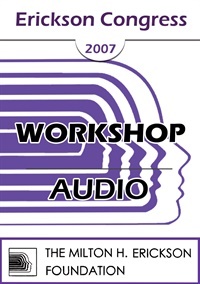
- Average Rating:
- Not yet rated
- Topic Areas:
- Workshops | Anxiety
- Categories:
- Erickson Congress | Erickson Congress 2007
- Faculty:
- Douglas Flemons, PhD
- Duration:
- 1:55:58
- Format:
- Audio Only
- Original Program Date:
- Dec 07, 2007
- Short Description:
- When performers of any kind–athletes, lecturers, singers–become self-consciously anxious in front of an audience, they lose the effortless, rhythmic flow of their experience. Workshop participants will explore hypnotic means of helping such clients regain an absorbed, body- based awareness and a coordinated involvement in their endeavor.
- Price:
- $15.00 - Base Price

- Average Rating:
- Not yet rated
- Topic Areas:
- Workshops | Children and Adolescent Therapy | Psychotherapy | Anxiety | Hypnosis | Post-Traumatic Stress Disorder (PTSD) | Self-Esteem
- Categories:
- Erickson Congress | Erickson Congress 2007
- Faculty:
- Susy Signer-Fischer, Lic. Phil. Psych
- Duration:
- 1:53:27
- Format:
- Audio Only
- Original Program Date:
- Dec 07, 2007
- Short Description:
- Self-esteem, self-confidence and self-concept are closely connected with the development of human identity. The enhancement of self-esteem and identity formation can be used effectively in psychotherapy with children, especially in the treatment of anxiety disorders, depression, post-traumatic stress disorder and many other social difficulties. Hypnotic interventions proved to be effective in working with children and adolescents on an individual basis.
- Price:
- $15.00 - Base Price
Tags: Anxiety Hypnosis PTSD Self-Esteem
Please wait ...

